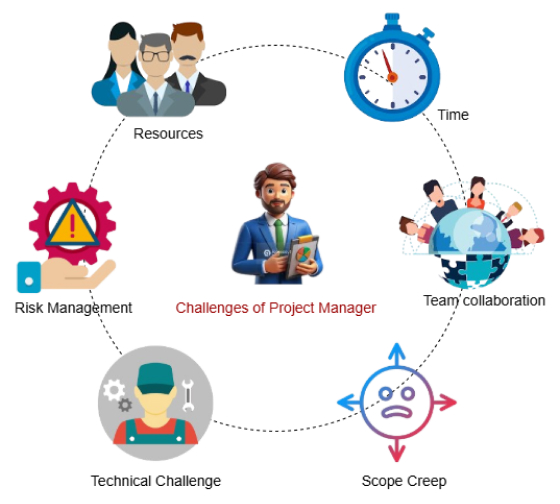What are common challenges in managing engineering projects?
Status
answered
Status
answered
Effective engineering project management is critical in delivering successful projects that meet deadlines. However, managing engineering projects comes with its own set of difficulties. These challenges often require a strategic approach and adaptability to overcome.
Let us try to understand the importance of project management for engineering with an example.
Imagine a civil engineering project tasked with constructing a new bridge. Midway through the project, unforeseen geographical issues are discovered, requiring a redesign of the foundation. This delay causes an overflow in cost and frustrated stakeholders.
The simple answer is to follow effective engineering and project management practices, including proactive risk management and effective stakeholder communication.
This example underscores the importance of engineering project management in addressing and mitigating challenges before they escalate.
The success of any engineering project is largely dependent on an efficient budget. Still, distributing limited resources, such as labor, tools, and supplies, among several project tasks is a frequent problem.
For example, consider an engineering software project in which a crucial team member is suddenly assigned to a high-priority project. Because the project team is understaffed, management is forced to either reorganize the workload or postpone the project’s completion date. Cross-functional cooperation and appropriate prioritization are necessary to balance such limitations.
Time management is considered one of the most important principles of engineering project management. Managing time means being able to address project risks and solve emergencies or setting realistic time frames, which is easier said than done.
Setting precise deadlines requires a deep comprehension of the work’s difficulty, resource availability, and project scope. Inaccurate time estimates for certain tasks might result in unrealistic schedules that strain the team and jeopardize quality.
Project delays might result from unforeseen disturbances, such as equipment malfunctions, a lack of resources, or outside influences. Sticking to the intended timeframe can be difficult because these problems frequently occur without warning. Early planning and effective risk management are essential to minimize the effects of such delays and keep the project as close to its original schedule as feasible.
Software engineering projects typically involve teams from a variety of disciplines, such as design, development, and quality assurance. To ensure everyone works well together and understands the same goals, strong leadership and regular updates are essential. Without good communication, teams may misunderstand each other, leading to mistakes and delays that affect the project’s success.
Scope creep is the term for unplanned modifications to requirements or extra demands from stakeholders. It takes effective leadership and proactive communication to handle such changes in an efficient manner while preserving project viability.
Unplanned changes can arise from various factors, such as evolving client needs, technological breakthroughs, etc. These changes frequently disrupt the original project plan, requiring adjustments in resources, timelines, or deliverables.
Investment in technology is now considered the key to success in engineering projects in the context of the current rapid development. However, this is always the case when implementing new technologies in an organization.
Technical issues like software bugs or equipment malfunctions might derail project timelines. Additionally, a team’s lack of specialized skills may hinder problem-solving efforts. Proactive measures like regular maintenance schedules and strong troubleshooting procedures ensure smoother operations and a lower chance of disruptions.
Managing risks means identifying potential problems and creating plans to handle them. For example, supply chain issues can be avoided by working with multiple suppliers and keeping extra stock.
Similarly, staying updated on rules and regulations helps ensure compliance and allows teams to adjust project designs if needed. Good communication within the team helps spot risks early and take action quickly.
Managing engineering projects is challenging but rewarding. Issues like resource allocation and risk management require teamwork and careful planning. Every challenge is an opportunity to improve processes and meet goals. By following best practices and focusing on continuous improvement, teams can handle future projects with confidence and creativity, even as the engineering world evolves.
